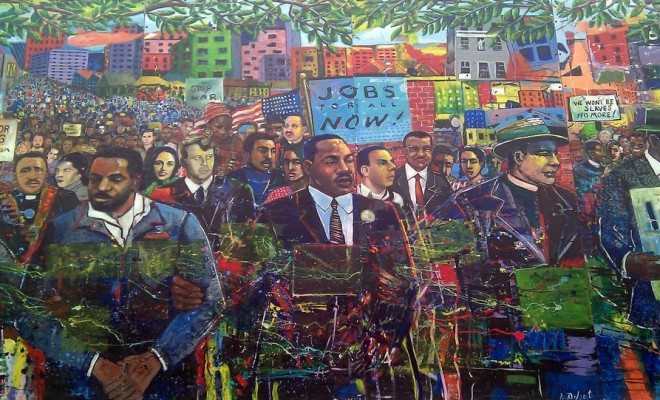 Image courtesy of [TheRealEdwin via Flickr]
Image courtesy of [TheRealEdwin via Flickr]
Crime
The Civil Rights Discussion: New Issues and New Debaters
Fifty years ago, the Civil Rights Act of 1964 was signed into law by President Johnson. Since then, the shape of the civil rights movement has transformed dramatically. Racial discrimination in voting, education, and employment began being combated by the activists of the 1950s and early 60s. Despite making progress since then, blacks and other minorities still face disparities, and they’re being addressed differently today. To further the cause, we need to know how the movement has changed.
What is the Civil Rights Conversation Today?
The transformation of civil rights and racial politics reveals what some scholars call the post-civil rights era. One such scholar, Howard Winant of University of California Santa Barbara, discussed what racism means in a modern context. In his piece “What is Racism?” he suggests that conservatives control the modern civil rights discussion. He says that the conservative revolution of the Reagan era created a wave of racial demands that used “individualism, competition, and laissez-faire” as its focal points. Although it was written in 1998, the principles he laid out are applicable today. Who are the conservatives engaging in discussions about civil rights now?
One politician stands out as taking the helm on civil rights issues from a political position: Rand Paul. Senator Paul of Kentucky, a libertarian Republican, has gained national attention. Although he may have started on the coattails of his father, former congressman and presidential candidate Ron Paul, Senator Paul has made some interesting moves in his own right. From cosponsoring a criminal justice reform bill with Senator Cory Booker (D-NJ), to introducing legislation to curb civil asset forfeiture, Paul is making noise in Washington.
Other conservatives are talking about civil rights outside of the capital, too. New Jersey Governor Chris Christie signed a bill that expanded the state’s drug court system; the policy is designed to help non-violent drug offenders access rehabilitation rather than serve time in prison. Libertarian groups like the CATO institute are also leading the way on discussing discrimination with scathing research on topics like police aggression.
Is there a problem with conservatism in the civil rights discussion? According to Winant, “racism is rendered invisible and marginalized” because of the right-wing’s domination of the discussion. He suggests that the conservative uprooting of the civil rights discourse resulted in a conversation “which deliberately restricted its attention to injury done to the individual as opposed to the group, and to advocacy of a ‘color-blind’ racial policy.”
But Senator Paul is acknowledging the racial components. In a Politico article he notes, “I believe in these issues. But I’m a politician, and we want more votes.” He’s actually advertising himself as the most prominent congressperson advocating civil rights for minorities, while admitting his political ambition. By recognizing the detrimental effects that excessive police force and the war on drugs have on racial minorities especially, is Paul changing the civil rights discourse while maintaining its conservatism?
How American civil rights issues are progressed is called into question by Paul. He may be referencing the disadvantages minorities continue to face as a result of these problems, but is his approach in line with true civil rights activism? Winant would call for a great emphasis on group collaboration and celebration. Meanwhile, the conservative and libertarian influence on civil rights issues would ensure that the political discussion remain an individualistic one. This dichotomy is important to keep in mind when discussing civil rights issues today.
The War on Drugs
The War on Drugs is remarkably impactful on civil rights. “Tough on crime” anti-drug policies, which have proliferated since the Nixon administration, swell America’s prisons and disproportionately affect the black community. Two drugs in particular largely define the epidemic: marijuana and crack-cocaine.
While marijuana laws across the country are loosening, black people are still 3.73 times more likely to be arrested for possession than white people. Employment opportunities are lost, and families are broken. Similarly, law enforcement’s aggressive response to crack, and the drug itself, ruined entire inner-city communities. Crack’s culturally-white counterpart, cocaine, was never targeted with nearly the same hostility. As the War on Drugs directly toppled black communities and severed their families, it caused a number of other issues in the realm of civil rights.
Excessive Policing
A primary issue is constitutionally-questionable policing. In an effort to confiscate assets involved in illicit drug transactions, law enforcement officers across the United States have been endowed with the authority to take money and property through a process called civil asset forfeiture. Roughly 80 percent of citizens in these cases are never charged with a crime, but police may seize their assets and use them to fund their department. Escalating since the 1990s, the militarization of police also results in excessive aggression against innocent people. With law enforcement offices across the country having easy access to federal military equipment, police take on unnecessary gear and, during a drug search or warrant serving, break into homes without knocking, traumatize people, and often kill innocents
The black community suffers disproportionately from both of these issues. A New Yorker article on civil asset forfeiture notes the disparities faced by blacks and minorities in these cases. For example, in Shelby County, Texas “the targets were disproportionately black or Latino.” The American Civil Liberties Union published an extensive report on police militarization and found that “the use of paramilitary weapons and tactics primarily impacted people of color.” Although blacks comprise 13 percent of the U.S. population, 39 percent of SWAT deployments impacted blacks, according to the ACLU. Only 20 percent impacted whites.
The War on Drugs led to excessive law enforcement practices that are are unsavory in their own right. But issues such as these consistently impact blacks at disparate rates. While a variety of problems now face minorities such as food insecurity and strict voter identification laws, the criminal justice system holds a great deal of political attention.
In some ways, the discussions we have these days about civil rights look very different than those that were prevalent during the hey-dey of the civil rights movement. The movement certainly has changed, and new players are entering the debates. What’s important to keep in mind is that the leaders of the current civil rights discussion shouldn’t only ask what can be done for each and every minority. They should also question how today’s civil rights conversation affects the community as a whole.








Comments